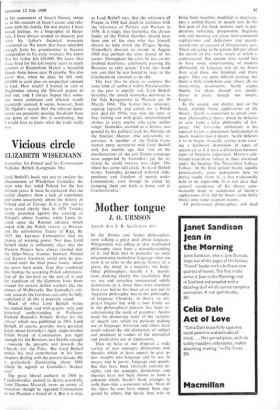Mother tongue
J. 0. URMSON
Speech Acts J. R. Searle (cue 45s)
In the 'thirties and 'forties philosophers were talking a great deal about language. Wittgenstein was telling us that traditional philosophy arose from a misunderstanding of it, and Ryle that in particular we were misconstruing mentalistic language when we took it to refer to the private history of a ghost, the mind, in a machine, the body. Other philosophers, notably J. L. Austin, were studying closely the vocabulary that we use and revealing unsuspected subtle distinctions in it. Since then more attention than ever before has been given not just to 'linguistic philosophy' but to the philosophy of language. Chomsky, in theory an em- pirical linguist but with a foot firmly set in the philosophical domain, has been re- volutionising the study of grammar; Austin made his pioneering study of the varieties of speech acts which we perform making use of language; Strawson and others have much refined the old distinction of subject and predicate in studies of the referential and predicative use of expressions.
Thus we have at our disposal a wide variety of new concepts, distinctions and theories which at least appear to give us new insights into language and its use, la langue and la parole, language and speech. But they have been relatively isolated in- sights, and the concepts, distinctions and theories have not been shown to form a coherent whole. Searle's book attempts to weld them into a consistent whole. Most of the ideas he uses have indeed been sug- gested by others, but Searle here tries to
bring them together, modified as necessary, into a unified theory of speech acts. In the first part of the book notions such as pre- dication, reference, proposition, linguistic rule and meaning are given inter-connected explanations and definitions and incorp- orated into an account of illocutionary acts. There are going to be serious debates about the details of this work, much of which is controversial. But anyone who would like to have some understanding of modern philosophy of language can do no better than read these one hundred and thirty pages. They are quite ditlicult reading, but there is little symbolism and, above all, no fence-sitting evasiveness. Searle argues bluntly for plain, though not simple. theses in plain, though not simple, English.
In the second, and shorter, part of the book, entitled 'Some applications of the theory'. Searle is concerned to attack com- mon philosophical theses which he believes to arise from .t false philosophy of lan- guage. The fact-value dichotomy is his especial target, a distinction fundamental in much modern moral theory. Searle believes it to be bogus, basically arising from treat- ing a legitimate distinction of types of speech act as if it were a distinction between types of linguistic expression. Moore's cele- brated naturalistic fallacy is. thus, discussed under the heading 'The Naturalistic Fallacy Fallacy'. In the final section Searle, equally provocatively, gives instructions how to derive 'ought' from 'is', a feat traditionally held to be impossible. It is not clear that general acceptance of his theory auto- matically leads to acceptance of Searle's applications of it: but he throws some hefty bricks into some stagnant waters.
All professional philosophers will read
this book anyway. Others who feel any interest in the topics discussed can be safely assured that it is a great deal more interesting than most and very clever.



































 Previous page
Previous page